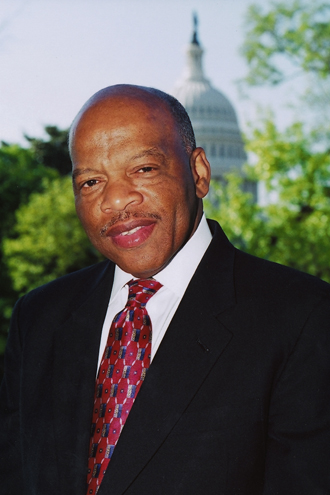Congressman Lewis exhorts audience to right wrongs

Congressman John Lewis
Congressman John Lewis’ (D-GA) travel plans were thwarted by bad weather in Washington, D.C., but his keynote address to the conference, “Blacks, Jews and Social Justice in America,” became a technology-enabled discussion. A live video conferencing feed connected the Shapiro Auditorium on Brandeis University’s campus to Lewis’ D.C. office, where he delivered his remarks, answered questions and shared historic photographs from his office wall.
Sponsored by the Brandeis American Studies Program, the conference marked the 50th anniversary of the murder of civil rights activists James Chaney, Andrew Goodman and Michael Schwerner in Mississippi.
In her opening remarks, professor Anita Hill thanked Congressman Lewis for all of his years of service to the cause of civil rights. Brandeis President Frederick Lawrence introduced Lewis, noting that his personal story resonates with the generation from the 1950s, which was profoundly impacted by Brown vs. Board of Education, the Supreme Court decision that struck down segregation in education. Lawrence noted that Lewis was a member of the Student Nonviolent Coordinating Committee and a coordinator of the March on Washington at the age of 23, evoking an audible reaction from the audience.
In his remarks, which received a standing ovation, Congressman Lewis noted that he plans to travel to Mississippi this summer to commemorate the anniversary of the 1964 Mississippi Summer Organizing Project, also known as the Freedom Summer. That summer, Chaney, Goodman and Schwerner went to investigate the burning of an African American church, a common occurrence as many churches were being used as organizing and voter registration sites.
The three young men were detained by authorities, arrested, jailed and, later that evening, turned over to the Ku Klux Klan, who beat, shot and killed them. “These three young men didn’t die in Vietnam, Eastern Europe, or the Middle East … they died right here in our country trying to help people of color participate in the democratic process,” said Lewis.
Lewis added, “We are one people, one family, the human family… Judaism teaches that mankind has a responsibility to repair or heal the world … Christianity teaches that we are all one human family, with the spark of the divine.”
Citing rabbis and noted African-American leaders, Lewis pointed to the historic kinship between the two groups.
“We compared ourselves to the people of Israel, and I believe that the Jewish people witnessed the suffering of others and drew on the suffering of their ancestors to relieve suffering. We have a mandate, we have a moral obligation, a mission, indeed a divine responsibility, to get involved.”
Lewis said he is unsure if the Civil Rights movement would have been as successful without the support of Jewish activist. “I don’t know what would have happened to many of us and many of our organizations if the Jewish activists did not risk their lives and careers by marching on Washington and Montgomery, by raising money to support the movement. There have been forces in America that separate and divide us but we must not go back, we must go forward. We have made a lot of changes, a lot of progress, but we are not there yet.”
Categories: Humanities and Social Sciences





